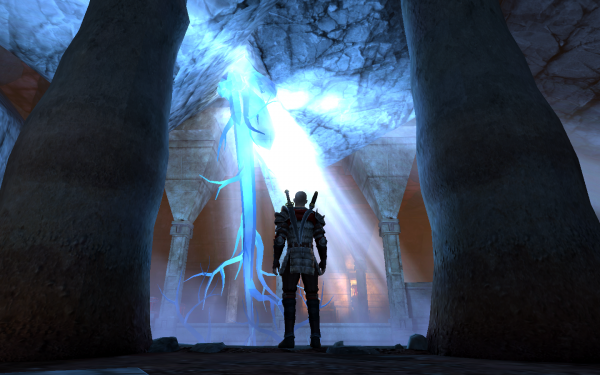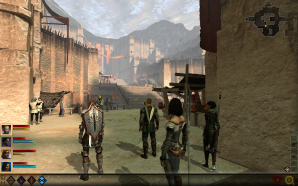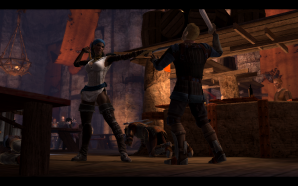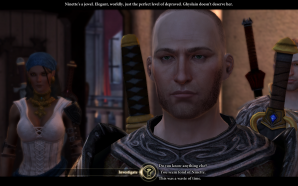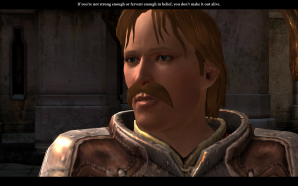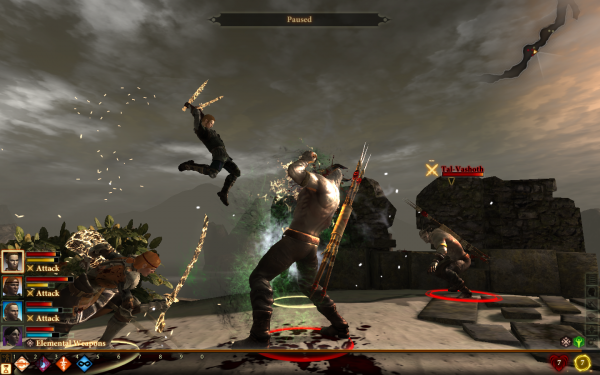Dragon Age II PC, Mac, Xbox 360, PS3 Review

Dragon Age: Origins was pretty great, so you can imagine how ridiculously pumped I’ve been about the arrival of Dragon Age II. After all, if a BioWare game has issues, it’s usually safe to assume they’ll be gone when the inevitable sequel turns up. Hell, just look at the jump from Mass Effect to Mass Effect 2; we went from a dodgy shooter with a crap frame-rate to something that felt more like a special version of Gears of War where you actually cared about anything that was going on.
Like Mass Effect, Origins wasn’t perfect. The combat was a bit ropey, compounded by the fact that the game had some really long combat sections. The good news is that the combat in Dragon Age II is loads better. The bad news is that pretty much everything else is worse.
Origins blew our tiny minds by allowing us to pick from a number of different character backgrounds, each one giving you a totally different start to the game and a different perspective on the story. Playing as an elf, for example, suddenly revealed various human characters to be massive racists, whereas you’d get no grief from them at all if you were a human. It was clear that a lot of effort had gone into making this work, and it provided a whole load of good reasons for multiple plays-through.
Dragon Age II takes a different route, and places you in the shoes of Hawke, a refugee from the village of Lothering. You can choose your gender, class, and appearance, but that’s it. This is a bit of a disappointment, but it does mean that your character’s dialogue is fully-voiced this time around. So, swings and roundabouts, right?
The game has also adopted the dialogue system from Mass Effect, wherein you choose the general tone of your response rather than the specific wording of it. I don’t doubt that this has irked some people, and not without reason, but it has been tweaked somewhat to show a little icon which more precisely represents the tone of your response. There’s a difference between being ‘nice’ and ‘diplomatic’, for example. A welcome modification to Mass Effect‘s more simplistic GOOD/NEUTRAL/BAD choices.
Rather than having you travel around throughout the game, Hawke and his companions spend most of their time in the city of Kirkwall. Personally I’m okay with this, as the city itself is pretty huge and beautifully put-together. What is disappointing, though, is that the story focuses almost exclusively on the brewing tensions between the templars and the mages. Mages are potentially really dangerous, see, as their powers make them ripe targets for possession by demons. The templars keep order by making sure this doesn’t happen. In Kirkwall, this means keeping all the mages in a massive prison and either killing, torturing or brainwashing them if they step out of line. As a result, the mages are kicking off.
Origins dealt heavily in moral ambiguity across a huge range of situations. Dragon Age II takes one situation and just sort of goes “Well, hey, there’s fault on both sides, right?!?” Rather than being clever and ambiguous, it simply makes you feel like your decisions at various key points (and especially towards the end of the game) are meaningless. Especially when, regardless of your choice, you usually end up having to kill a bunch of people whose side you were on. It’s ridiculous, lazy, and hugely frustrating.
One of Hawke’s most remarkable characteristics is that he isn’t remarkable at all; he’s not a Grey Warden, or The Chosen One, or the first person to find a mysterious artifact that bestows him with mystical powers. He’s just some guy trying to take care of his family after their home is destroyed. This is a pretty brave decision from BioWare, and they’re to be commended for that, but sadly it falls on its arse. Despite the fact that Hawke is constantly surrounded by his family, we hear almost nothing of his life in Lothering, and are given little reason to care about him or his irritating sister. And why, if he’s just some guy raised on a farming village, can he stab monsters so hard that they burst?
Hawke’s companions aren’t much better, either. Almost all of the companions in Origins had compelling background stories, and you’d quickly find yourself sticking with the same set of characters purely because you liked having them around. In Dragon Age II, however, the members of your party are far more likely to be picked based on their combat abilities, as their personalities do little to recommend them. Better yet, because I skipped one side-quest, I was unable to get one character to join my party, and was stuck with only one warrior for the entire game. Having a warrior in your party is essential thanks to their ability to draw enemy attention and soak up damage, but when that warrior is entirely dull and you have to keep her at your side for the entire game, it gets a bit much.
Here’s another fun fact: all of the potential love-interests in the game, bar one, are bisexual. Now, I hope I speak for everyone reading this when I say that isn’t a problem in and of itself. But if we agree that the idea of so many characters in one group being bisexual is highly unlikely, then the implication is that they’re all switching their sexuality on the fly, just to suit what the player wants. Not only are BioWare abandoning believable characterisation in the name of player wish-fulfilment but, rather than a progressive embrace of homosexuality in games, it implies the more offensive notion that a person’s sexuality is a lifestyle choice. I’ve spoken to at least four gays in my time, and can confirm this isn’t the case.
But hey! The combat’s really good, and brilliantly tailored to both the PC and consoles. The PC version behaves much the same as it did in Origins, while the console versions retain the tactical depth but with a sprinkling of button-mashy action. People have complained about the lack of a proper overhead camera on the PC version, but I can’t say I missed it once. The combat tactics are still there, but far less intrusive than they once were. For example, you no longer need to grab your allies by the face and shout IF WE ARE DYING, PLEASE AUTOMATICALLY HEAL US. The basic stuff is all done for you, but if you want to get involved and set up some nifty cross-class combos, you can.
The introduction of closing attacks is also entirely welcome. If you’re playing as a warrior or rogue, and attack an enemy from a certain distance, your character will leap towards them and do extra damage with the initial hit. When faced with a group of weaker enemies, this sometimes means you can merrily leap between them, dispatching them all with a single blow each. It speeds things up considerably, and it’s immensely satisfying to boot. That said, as fun as the combat is, there is a lot of it. At times it feels like you can’t even stroll through town at night without getting set upon by a gang of 20 thugs, even in the later stages of the game where everyone knows you’ve successfully eviscerated every single person, creature or demon who even dared to look at you funny.
Dungeon-crawls quickly become tedious too, although this is largely thanks to the game’s repeated use of generic environments. For example, the game features one ‘cave’ area, used for literally dozens of missions that are supposed to be in different locations. Efforts to maintain the illusion that you’re in a different cave each time are made by sealing off certain rooms (though you can still see them on the map), and making the player go through the area via a different entrance and exit, but this does little to stop you realising you’re just in the same bloody cave, again.
Dragon Age II isn’t a bad game, but it is a huge disappointment from such a respected and otherwise consistent developer. While the combat has been improved significantly, its failings in other areas – areas in which BioWare usually excel – are numerous and baffling. In the 32 hours it took me to finish the game, I spent the last 10 wishing it would hurry up and get to the good bit at the end. And then it turned out the ending was a bit non-committal and rubbish, too. A shame.

